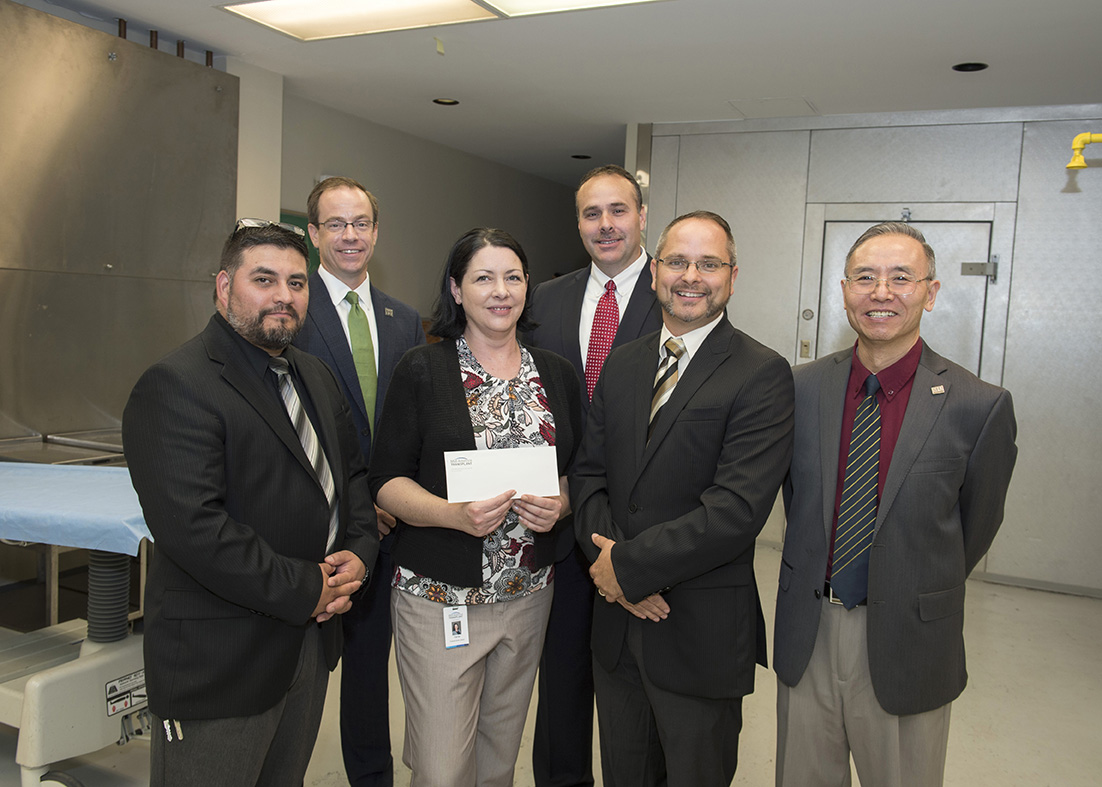
Continuing relationship – A donation last week by Mid-America Transplant Foundation will mean embalming lab upgrades, more equipment and continued undergraduate research assistantships for SIU Carbondale’s Mortuary Science and Funeral Service program. Present for the donation was, from left, Abel Salazar, clinical instructor of mortuary science; Kevin Lee, vice president of community engagement, Mid-America Transplant; Carrie Hering, funeral home liaison Mid-America Transplant; Scott Collins, director, School of Allied Health; Anthony Fleege, mortuary science and funeral service program director, and Andy Wang, Dean of the College of Applied Sciences and Arts. (Photo by Russell Bailey)
August 20, 2018
Donation to help upgrade Mortuary Science program lab, provide assistantships
CARBONDALE, Ill. — A donation by Mid-America Transplant Foundation will mean renovations and additional equipment for Southern Illinois University Carbondale’s Mortuary Science and Funeral Service embalming lab and continued undergraduate research assistantships for the program.
The bulk of a $98,000 donation presented on Aug. 17 will be for renovations and equipment, with $15,000 going toward supporting students with assistantships, Anthony Fleege, program director, said. This is the third year the foundation has provided support and the donation is the largest to a non-medical unit, he said.
Providing continued support
The foundation approached the program about three years ago as it identified a shared purpose in serving families and supporting the community. To date, the foundation has provided nearly $134,400 to the university and SIU Foundation in support of the Mortuary Science and Funeral Service program, Kevin Lee, vice president of community engagement for Mid-America Transplant, said.
Mid-America Transplant Foundation has been “our greatest supporter and collaborator,” Fleege said. In addition to supporting students through assistantships, scholarships and board fee reimbursement, the foundation supports faculty through grants to travel and continue professional development and research.
Educating next generation of funeral home professionals
Lee said Mid-America Transplant and its foundation are proud to partner with the university “as it educates the next generation of funeral home professionals.” The foundation has shown a commitment to the ongoing development of a strong, skilled workforce within its designated services area and is continually reviewing opportunities to support students.
“As funeral home professionals, these students have the ability to impact thousands of lives during their career,” Lee said. “Every day these dedicated individuals work with families in times of unimaginable grief, providing compassion and comfort. We too seek to offer solace by providing their loved one with the opportunity to save lives through organ and tissue donation. We are grateful for the role funeral home professionals play in their communities and for their support of the organ and tissue donation process.”
Donation is “invaluable to program”
The embalming lab renovations will provide students with one of the most up-to-date facilities in the Midwest, said Fleege, noting that there have not been “any significant upgrades” in about 40 years. The facelift will include drywall repair, paint and new ergonomic flooring. The project should be completed by Jan. 1, 2019.
The equipment donation will provide for:
- a camera/microphone over each embalming station connected to a large monitor over each station and a DVR to record all embalming and restoration operations. The monitors will also be connected to a laptop computer to assist students while they are embalming and doing lab activities.
- A new embalming table, so there will be four individual workstations for the optimal student-to-donor ratio.
- An upgrade in clinical and hairstyling instruments, and workstation tools.
Research assistantships help students
The research assistantships allow students interested in doing research to advance in the mortuary science field, Fleege said. Students are paid for 20 hours a week so they can concentrate on school and research and guided by faculty to narrow topics and provide “valuable research outcomes that mainly focus on the donation and transplantation process as it relates to the field of study.”
Students also work on their embalming topics for the senior embalming colloquium, as well as their own focused research, Fleege said.
Select program in Illinois
The bachelor’s degree program is the only mortuary science and funeral service program of its kind offered at a public university in the state. The program is accredited by the American Board of Funeral Service Education and students who graduate meet the state’s Department of Professional Regulation licensing requirements.
